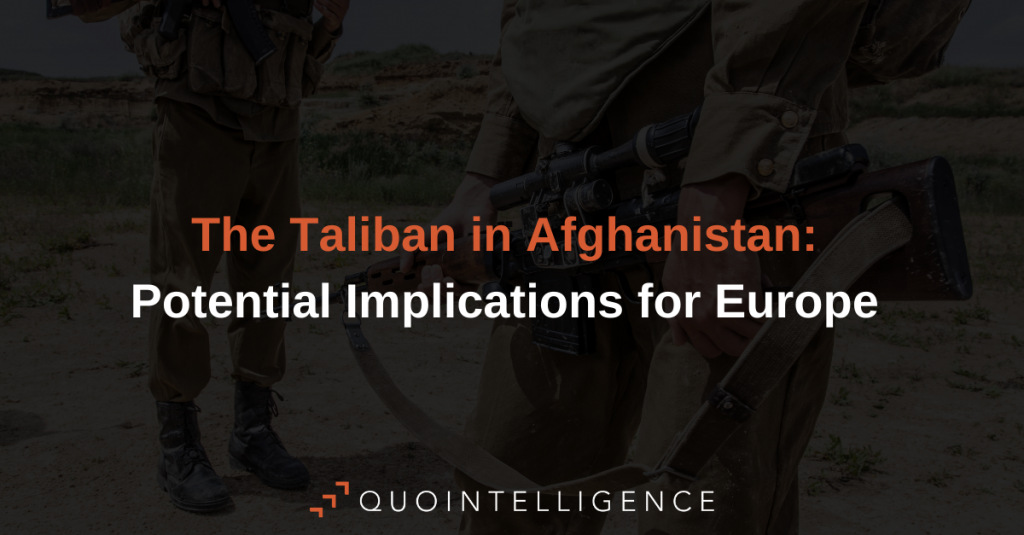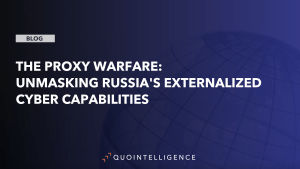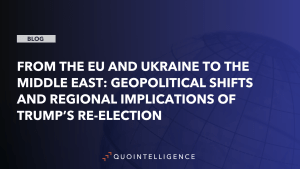This analysis first appeared in our Weekly Intelligence Snapshot. Subscribe now to receive weekly Intelligence on the geopolitical and cyber threat landscape
We covered the Taliban’s takeover of Afghanistan and the evacuations of Western troops, civilians, and Afghan allies in-depth in last week’s Weekly Intelligence Snapshot.
The situation in Afghanistan remains in flux, and key economic, political, and diplomatic issues continue to evolve. While these issues will likely change over the coming weeks and months, we have evaluated some key implications.
Our analysis includes debates surrounding refugees, terrorism threats, and questions about future trade and diplomatic relations.
The Influx of Refugees
Between 2015-2016, the influx of refugees from the war in Syria and the wider region resulted in one of the worst crises of the EU.
The crisis accelerated already existing tensions between European member states and within nations. It ultimately resulted in a surge of populist parties on one hand and calls for closer international cooperation on the other.
The EU has since attempted to create a unified and fair system for processing and distributing refugees across the EU. However, the union has not yet created such a framework.
The use of advanced tech to track migrant flows
In the meantime, the EU and border countries are focusing on methods to prevent refugees from entering the union.
The EU could seek another deal with Turkey to host refugees in return for EU investment, similar to a deal already in place for Syrian refugees. In addition, the EU could provide financial support to countries in the region, such as Pakistan, to host refugees and discourage them from traveling to Europe’s borders.
In addition, the EU’s border agency is also advancing technology to better detect and track migrant flows, and border countries, including Greece and Poland, are enforcing their borders with increased security.
The current Afghanistan crisis could reawaken memories of the highly emotional refugee crisis in 2015-2016. It comes at a time when the EU, as well as individual member states, are still grappling with the ongoing COVID pandemic and its economic and political fallout.
A renewed debate about refugees could exacerbate existing divisions across the EU. It could also strengthen populist parties and decrease trust in EU institutions and their role at home and abroad.
Increased Terrorism Threat
The Taliban previously provided al Qaeda with a safe haven in Afghanistan to conduct their international terrorist activities and could do so again.
Both their capabilities have grown. They now have weapons and technology provided by US and allied troops and the potential to recruit Afghan soldiers trained by the US army.
Further, with the withdrawal of troops, the US and Western allies have significantly reduced their intelligence capabilities. Their ability to detect and react to terrorism and security threats early on has been severely diminished.
This could lead to an increased terrorism threat by other groups, as seen just a few days ago when ISIS suicide bombers killed thirteen US service members and at least 60 Afghans outside Kabul Airport.
Impact on Geopolitical Power Competition
China and Russia are accepting the Taliban leadership of Afghanistan and are both interested in investment opportunities and infrastructure projects. Afghanistan reportedly has USD 1 trillion of unexplored mineral deposits, including lithium, rare earths, and copper – all currently highly sought-after for new generation technologies.
Access to these natural resources could further increase existing dependencies on China for production and accelerate the great power competition between China and Western nations. It will also increase existing dependencies on China for production.
In addition, the US and allies’ influence in the Middle East is waning with the military removal from Afghanistan and partly Iraq. Russia and China are moving into the void left by Western troops and could therefore shift global power dynamics further.
Cooperating with future Afghanistan
The Taliban have voiced their intentions to create a legitimate and internationally recognized government. They have also announced a reversal of some of their previous standpoints, such as not seeking revenge on opponents and respecting women’s rights to some, yet unspecified, extent.
However, it remains to be seen to which extent the Taliban will stick to their word. Regardless, at some point, the EU will have to communicate whether it views the Taliban as a legitimate regime and how it envisions diplomatic and trade relations.
The EU is still wavering
The EU and other countries have halted financial aid programs and are waiting to see how the situation in Afghanistan evolves. China, on the other hand, is already eying up Afghanistan’s rich natural resources offering support in rebuilding the country.
If the Taliban cannot access Afghanistan’s assets located outside of the country, receive international aid, or finances on the international market, they might increase cooperation with terrorist organizations or further rely on illegal businesses, such as the drug market, to generate funding.
The US stood by its agreement to leave Afghanistan by 31 August. They have indicated, however, that it will continue communicating with the Taliban as the representatives of Afghanistan.
In the past, The US administration negotiated with the Taliban, which has led to the current peace deal. The director of the CIA has even reportedly met with a Taliban representative to discuss further evacuation plans.
Impact on Cybersecurity
The Taliban are unlikely to develop offensive cyber capabilities and use cyberspace to target adversaries in the foreseeable future. While the Taliban have used social media and messaging apps for propaganda measures, they have not shown any advanced cyber capabilities.
However, the Taliban could leverage the hardware and potentially sensitive data left behind by the US and allied military. They could sell these to other countries capable of using the data for cyber operations or for broader reconnaissance.
In addition, depending on the Taliban’s access to the global financial system, the group might increasingly rely on cryptocurrencies to finance their economy. They could use the crypto market to launder funds made through illegal businesses, such as the drug market.
Additionally, the Taliban could leverage the hardware and potentially sensitive data left behind by the US and allied military. They could sell these to other countries capable of using the data for cyber operations.
Our Takeaway
The situation in Afghanistan will evolve in the coming months with the Taliban establishing their regime.
Two of the main factors that will determine the Taliban’s success in Afghanistan are their access to funding and recognition from external powers to establish international trade and political relations. While the Taliban was very successful in asserting control over many areas of Afghanistan, resistance in some regions is ongoing.
A domestically and internationally recognized Taliban regime also depends on the extent to which the Taliban has evolved from a tribal military group to a structured political entity. The Taliban needs to prove its ability to run a country, stabilize the domestic economy, meet the demands of its population, and engage in international diplomacy.
In Europe, the swift advance by the Taliban will likely result in critical challenges: There will be a renewed debate on refugees, potential increased terrorism threats, and questions over accepting the regime’s legitimacy. All these issues could potentially heighten divisions across the EU and destabilize the union.
Did you enjoy this story?
In our Weekly Intelligence Snapshot, we cover even more original research and underground news.
Subscribers can access the complete Intelligence Snapshot as opposed to only the summary. The full version includes detailed information on threat actors, vulnerabilities, patches, IoCs, and recommended actions.





